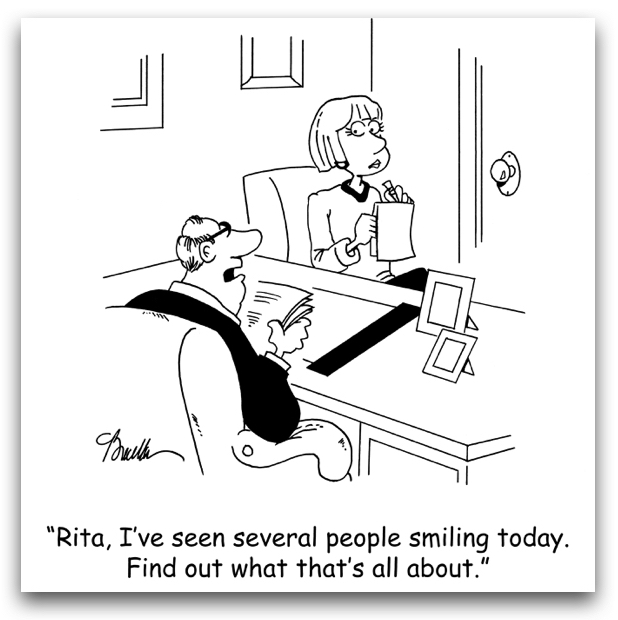 A man without a smiling face must not open a shop. —Chinese proverb
A man without a smiling face must not open a shop. —Chinese proverb
About every two years I reread Dale Carnegie’s terrific book, How to Win Friends and Influence People. Though written 90 years ago (1926), it is so rooted in basic human psychology, it still speaks to our modern age.
He taught seminars based on the book to large audiences in New York City.
Carnegie devoted an entire chapter—titled, A Simple Way to Make a Good First Impression— to the topic of smiling. When he taught this chapter at his seminars, he gave his students a simple assignment: Smile at someone every hour of the day for the next week and then come back to class and talk about the results. The positive results of this simple exercise were profound. His students learned that a smile is one of the most potent people skills and that it can dramatically improve human relationships.
Richard Wiseman, in his book Quirkology: How We Discover the Big Truths in Small Things, said, “People smile when they feel happy. However, evidence suggests that the mechanism works in reverse; that is, people feel happy simply because they have smiled.” He refers to a 1988 research project conducted by Fritz Strack in which participants in one group were asked to hold a pencil between their teeth, but to ensure that it did not touch their lips which forced the lower part of their faces into a smile. Another group was asked to support the end of the pencil with just their lips, not their teeth, which forced their faces into a frown. The results revealed that people actually experience the emotion associated with their expressions. Those who had their faces forced into a smile felt happier (page 205).
Carnegie concluded his chapter on the power of a smile with these words:
The Value of a Smile
- It costs nothing, but creates much.
- It enriches those who receive, without impoverishing those who give.
- It happens in a flash and the memory of it sometimes lasts forever.
- None are so rich they can get along without it, and none so poor but are richer for its benefits.
- It creates happiness in the home, fosters good will in a business, and is the countersign of friends.
- It is rest to the weary, daylight to the discouraged, sunshine to the sad, and Nature’s best antidote for trouble.
- Yet it cannot be bought, begged, borrowed, or stolen, for it is something that is no earthly good to anybody till it is given away.
Let’s accept the same assignment Dale Carnegie challenged his students with: Smile at someone every hour of the day for the next week and then come back to class and talk about the results. Or, in our case, respond to this blog post.
[reminder]What are your thoughts about this essay?[/reminder]

I experience this truth many times each day. It’s the only way to live. I can’t imagine looking at anyone and not smiling first. It changes everything about the encounter.
Susan, your words are well said and worth saying. Thanks, Don
Great reminder Don! Challenge accepted.
It made me smile. Thanks?
Thanks, Justin. I hope you are doing well.
don
A big smile is a magnet–it attracts people to you. It tells people you are open and safe to approach. Wonderful way to open conversations.
Good words, Kendel.
Thanks Don. You brighten my Sunday morning when you greet the congregation with your smile. Our trip to Israel will never be forgotten.
Thanks, Clyde. Our trip to Israel was a highlight of the year, particularly being with you and Suzanne.
Great post! When I smile at someone I almost always get a smile back. What a great gift to give and receive. Thanks Don!!
Thanks, Scott, for sharing your thoughts. We’re looking forward to hearing the DSO @ SCC on May 7. Don
It is great and very true. I smile most of the time. It is contagious. Sometimes I even tell some of my students to smile.
Caleb, thanks for the affirmation. Smiling is so simple but so powerful.
Don